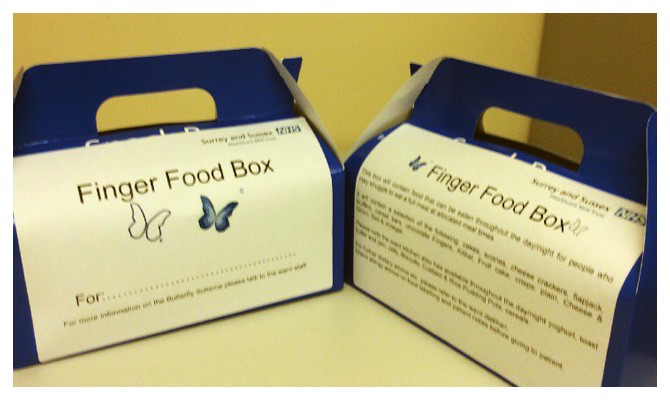When the Butterfly Scheme Lead at East Surrey Hospital told me about the finger food boxes he and his team were developing for people using the scheme, I had no hesitation is allowing the scheme’s symbol to be used on them. Many Butterfly Scheme hospitals now have additional menu items available for people living with dementia and there have been some quite dramatic turnarounds in people’s recuperation because of that.

Understandably, the East Surrey team proudly announced the new snack boxes on Twitter. There were lots of very positive responses, but one response was negative and, I think, shows how easy it is to completely misunderstand what dementia care needs to be. That one response berated the team for offering sugary snacks and stated that hospitals should be teaching people about healthy eating.
That person was well-meaning, of course; hospitals can indeed be places where people’s diet can be helpfully amended. In dementia care, though, we can’t expect to change the person’s habits – in fact, much of dementia care centres on working with each individual’s own habits and preferences, because routine and familiarity are what allow that person to function at their best. It’s the changes in routine and familiarity when hospitalised that cause the greatest issues for a person living with dementia – so if that person stops eating in hospital, but usually eats certain biscuits and can be tempted by those, how much better that sugary calories are consumed, rather than no calories at all! Snacks shouldn’t be offered as an alternative to a balanced diet, but can be a valuable supplement at a time when someone isn’t at their best and may be struggling to eat anything.
To me, this incident illustrates what happens when someone who has a particular interest or expertise in one specialist field believes that they can automatically apply that to dementia care. Dementia care is very much a specialist field in its own right and may often overturn techniques and approaches otherwise regarded as best practice. Even now, the importance of dementia care leadership teams is often undervalued – yet without that leadership and expertise, well-meaning care so often results in inappropriate dementia care.
So – congratulations again to East Surrey Hospital on the introduction of its snack boxes and on its insight into dementia care! (and if you think you can automatically apply your own field of expertise to dementia care, do please check with someone who can, in turn, offer you expert guidance in that field)
